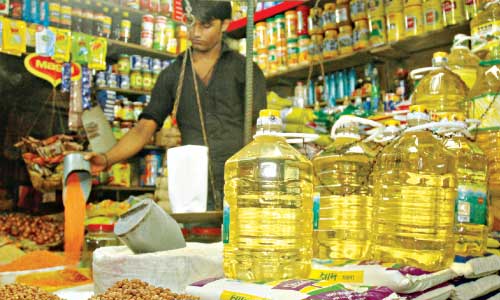The National Board of Revenue has allowed edible oil millers to pay value-added tax at only one stage of supply chain of the product to reduce traders’ hassle in paying VAT at different stages.
The revenue board on Monday issued a statutory regulatory order providing the traders with exemption from paying VAT at production and trading stages.
The facility was given to refined soya bean and refined palm oil for more than 16 months up to June 30, 2016.
Officials of the revenue board said the total VAT rate, however, would increase a bit to 15 per cent which would be payable at only import stage.
Earlier, the total VAT incidence was around 14.88 per cent including 10 per cent at import stage, 15 per cent on specific tariff value of the product at production stage and 4 per cent at trading or distribution stage.
For availing the facility, importers, refiners and traders will have to fulfil all the formalities including maintaining accounts and tax-related documents for both production and trading stages, they said.
Edible oil traders have been demanding for long for introduction of a single-stage VAT saying that VAT at three stages — import, production and trading or distribution — is causing hassles for them due to frequent interruption by VAT officials at different points.
The revenue board initially opposed the plea of importers of vegetable oil saying that acceptance of such demand would disrupt the standard VAT collection system and might create a scope of tax evasion.
But the NBR later agreed to provide the facility in line with the approval of the finance ministry for which the commerce ministry strongly recommended the NBR for accepting the demand.
The officials said the facility would be withdrawn after the implementation of the new VAT law which was supposed to be effective from July 2016.
They said the facility might create scope of VAT evasion by the traders taking the advantage of waiver at production and trading stages.
‘Edible oil is imported in bulk and the customs wing of the revenue board has to accept quantity of imported oil based on the declaration of the importer and documents provided by the shipping agents and surveyors,’ a high official told New Age.
The customs wing has no mechanism to measure the actual quantity of imported oil which may create a room for tax evasion through declaring less quantity of the product, he said.
Imposition of VAT at production and trading stages used to work as preventive measures and full volume of imported product came under the tax net, if any importer made false declaration to evade VAT, he added.
He, however, said that the condition of maintaining necessary accounts and documents would allow the VAT officials to crosscheck the actual quantity of import, and the quantity of production and sales.
Source: New Age


